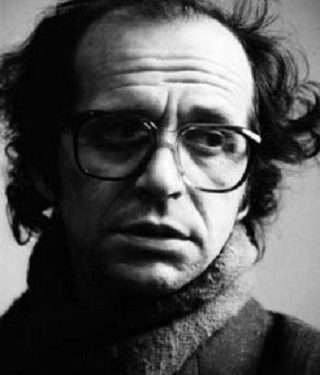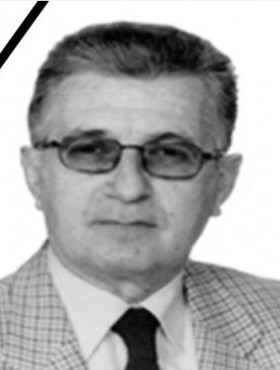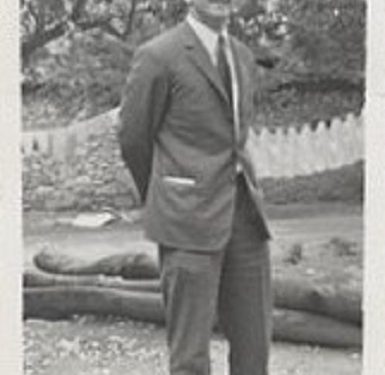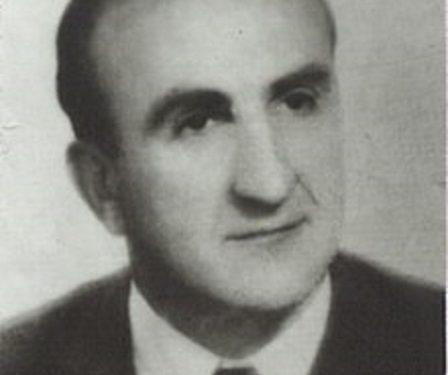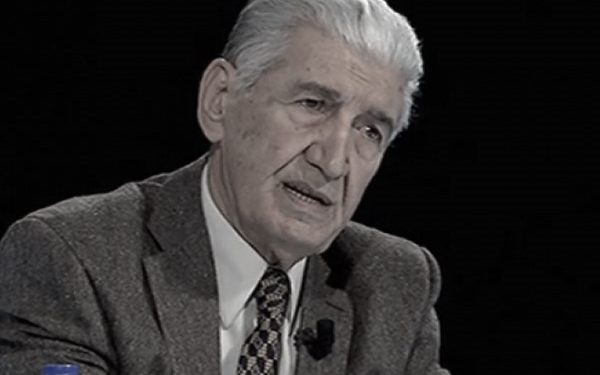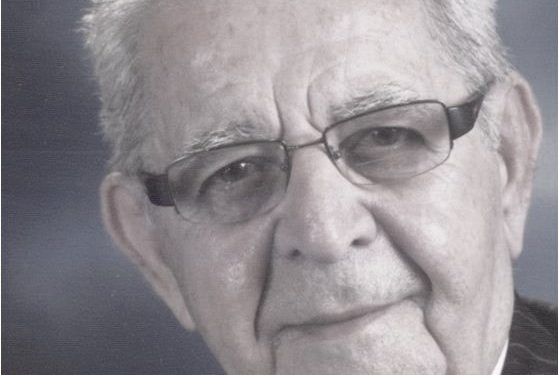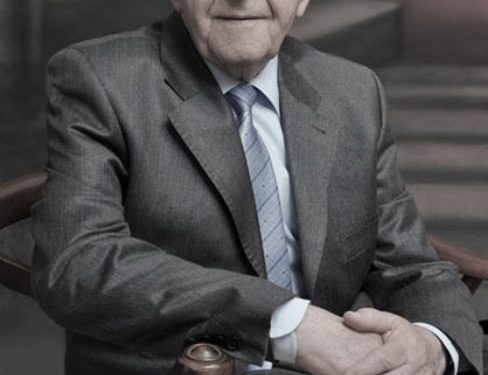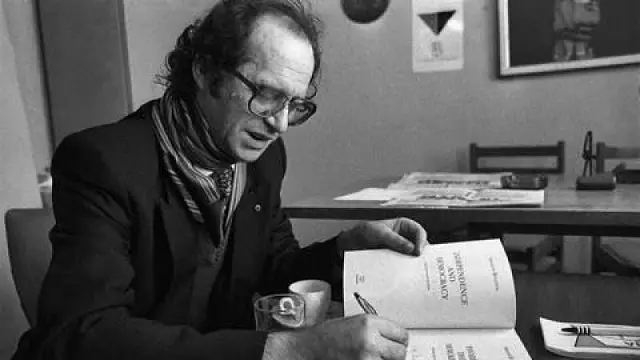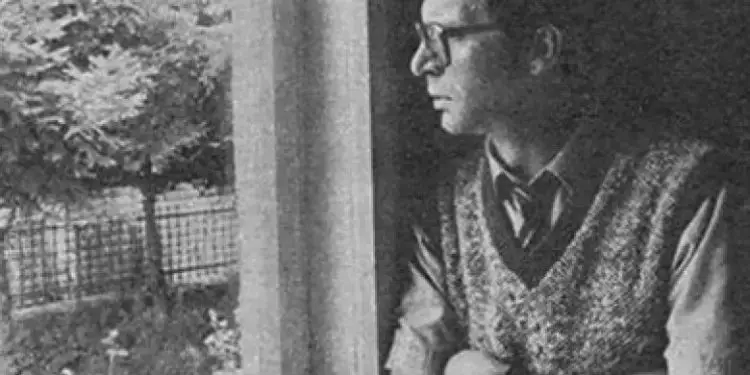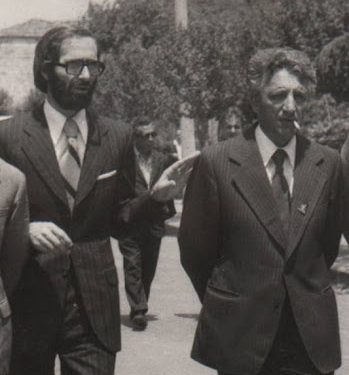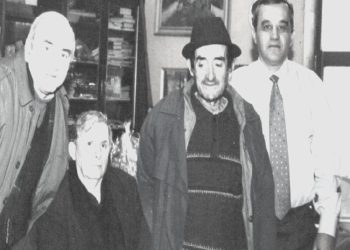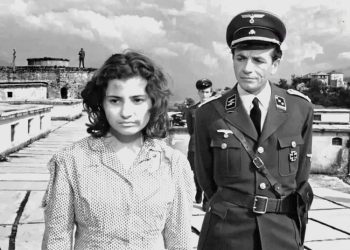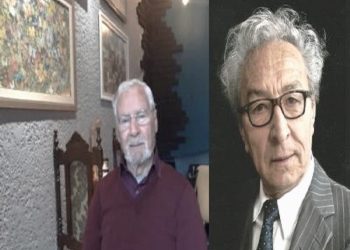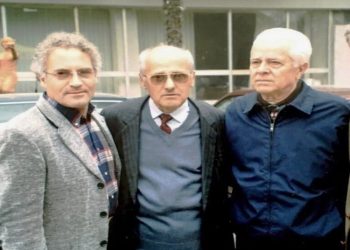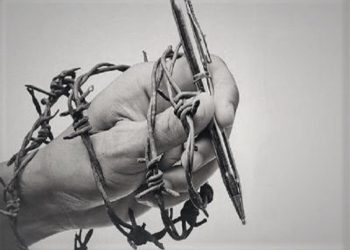Dashnor Kaloçi
Memorie.al publishes an archival document issued by the Central State Archive in Tirana (fund of the former Central Committee of the ALP), which contains a report-information with the initials “Secret” belonging to the month of June 1974, sent the education sector at the apparatus of the Central Committee of the ALP, by two well-known professors and researchers, academics, Prof. Dr. Hamid Boriçi and Prof. Dr. Jorgo Bulo, regarding a few days visit to Albania at that time by their two colleagues from Kosovo, Prof. Dr. Ibrahim Rugova (then a researcher at the Albanological Institute of Prishtina) and Prof. Dr. Ali Aliu, (lecturer of the Department of Literature at the Faculty of Philosophy of the University of Prishtina), who had come to Tirana at the invitation of the Institute of Linguistics and Literature. Complete information report compiled by two well-known academics for their colleagues from Kosovo, where in addition to professional conversations on literature and linguistics, and their fellow writers from both sides of the border, they have described in detail and in detail all other conversations of a political nature, mentioning Josip Broz Tito and the policy he followed at that time in Yugoslavia, etc., as well as their movements and meetings during the entire period they stayed in Albania from May 27 to June 7. 1974, where they also visited the cities of Vlora, Fier, Gjirokastra, Saranda, Durres, Elbasan and Korca.
The document that we are publishing in this chapter of the book, is a report-information with the logo “Secret” for the Central Committee of the ALP, drafted by professors and well-known researchers, academics, Prof. Dr. Hamid Boriçi and Prof. Dr. Jorgo Bulo, regarding a few days visit to Albania in June 1974, their two colleagues from Kosovo, Prof. Dr. Ibrahim Rugova (then a researcher at the Albanological Institute of Prishtina) and Prof. Dr. Ali Aliu, (lecturer of the Department of Literature at the Faculty of Philosophy of the University of Prishtina), who had come to Tirana at the invitation of the Institute of Linguistics and Literature.
The visit of the two well-known intellectuals from Kosovo was a continuation of a series of mutual visits and meetings, which had begun in the late 1960s between representatives of educational, cultural, artistic and sports institutions of Albania and those of Autonomous Socialist Province of Kosovo. And all this, which resembled a “honeymoon” between official Tirana and the Titoist regime in Belgrade, (from where all bilateral agreements with Albania were passed and approved at the Foreign Ministry in Belgrade), followed a policy of silent rapprochement and without fuss that Enver Hoxha made with Tito, immediately after the military aggression of the Soviet Union against Czechoslovakia. Where as a result of some regional conjunctural policies, Tirana and Belgrade among themselves declared the Soviet Union as a common enemy of theirs, against whom they would know how to defend themselves?!
In this political atmosphere of that time, different groups or individuals arrived in Tirana and vice versa in Prishtina, as in the case in question, Ibrahim Rrugova and Ali Aliu. But even despite the “honeymoon years” with Tito’s Yugoslavia, the communist regime in Tirana, not only never reduced its vigilance, but on the contrary, through its structures, “turned a blind eye” to every foreigner who visited Albania. Be they and the “friends from Kosovo”, as Kosovars were considered at that time by the official policy and propaganda of the communist regime in Tirana.
Even, “friends from Kosovo”, were controlled much more than foreigners, monitoring them at all times for all their movements through Albania and not only that, but also by recording and analyzing every word, action, expression and thought of them. Which is clear from this archival document with the report-information in question that we are publishing in full in this part of the book, where the competent party and state bodies, have charged for its compilation, two professors, researchers and academics known Prof. . Dr. Jorgo Bulo (philologist and literary historian at the Institute of Linguistics and Literature) and Hamit Boriçi, (former journalist, editor and editor-in-chief of the newspaper “Bashkimi” from 1963 to 1990 and professor of journalism at the Faculty of Philology of the State University of Tirana) who unfortunately could not escape neither the mechanisms by which that regime operated, (their inclusion as companions of colleagues from Kosovo), nor the official propaganda of the time, as apparently from the document in words that are published in full in this part of the book, the report-information compiled for colleagues from Kosovo, exceeds all the targets of their work and profession… ?!
Report-information of Prof. Dr. Jorgo Bulo and Prof. Dr. Hamid Boriçi for the Central Committee of the ALP, regarding the visit to Albania of Dr. Prof. Ibrahim Rugova and Dr. Prof. Ali Aliu, in June 1974
I N F O R M A C I O N
On the visit of Kosovar scholars to our country
At the invitation of the Institute of Linguistics and Literature, a group of Kosovar scholars on the history of Albanian children’s literature came to our country from the Albanological Institute of Prishtina. The group consisted of two people: Ali Aliu, professor of literature at the Faculty of Philosophy of the University of Prishtina and Ibrahim Rugova, researcher at the Albanological Institute of Prishtina. They were invited and participated in the scientific symposium organized for some problems of Albanian children’s literature, which was held in Tirana on 27 and 28 May.
The group of researchers stayed in our country from May 27 to June 7. During those days he visited the cities of Vlora, Fier, Gjirokastra, Saranda, Durres, Elbasan and Korca. In these cities, Kosovar scientists were introduced to our successes achieved during the thirty years of popular power. According to the program, they visited the museum, historical objects, work center and production. In Korça they also visited the agricultural cooperative Rëmbec.
During the visits, they showed interest in getting to know the various objects and works as well as possible. Ali Ali in particular was active. He asked questions aimed at deepening his knowledge of the object visited. While, Ibrahim Rrugova, in most cases was indifferent. Ali Aliu, constantly and, more rarely, Ibrahim Rrugova spoke with admiration of our successes.
Even after the visit to Korça, in Rëmbec of Korça (this cooperative was visited together with the group of Kosovar writers, who participated in the symposium, invited by the League of Artists and Writers of Albania), Ali Aliu opened a conversation with friends own, appreciating successes. He was impressed that the village had 15 televisions, the cooperative houses, the village museum, the block of the trade unit, the school, the municipal systems, etc.
Ali Aliu has more knowledge about our country than Ibrahim Rrugova. He has come to Albania several times. Ibrahim comes for the second time. The first row, as he points out, he stayed three weeks as a student. It is back due to illness.
We think that their approvals and beautiful words about our successes should be taken with reservation, more like flattery, as an attempt to convince that they are our lovers, that they value everything fairly and objectively. Their goal is to create the opportunity for them to come to Albania again. The two have expressed this on different occasions. Ali Aliu even expressed this desire in the meeting he had with the leaders of the Institute of Linguistics and Literature. He asked to come in November this year to participate with a paper in the national symposium on the novel, which will be organized by the Institute in cooperation with the League of Writers and Artists of Albania.
In conversation with them it is not difficult to conclude that the Kosovar intelligence nurtures love and high consideration for Tito, and consequently for the regime in power. They consider Tito as the savior of the Kosovo Albanian nationalities, who “secured his rights and freedom” in Kosovo today and for his “prospects”, which will be realized in the continuous efforts of the Kosovar intelligence. They have relied on 20,000 students, school youth, cultural development. The working class is the peasantry, which they do not even have in their mouths in their troubled days. Even when it came to them, directly or indirectly, they considered them as insignificant social forces.
For the workers and peasants, in a conversation, Ibrahim Rugova said: “Economic emigration has perverted them. They go and work far from Kosovo, far from Yugoslavia in large enterprises especially for the construction of industrial facilities in Germany, Austria and elsewhere. There they provide some income. And after a few years (usually four years young), come and improve economic and living conditions. “There are cases that do not return there at all, that seek to take their families.”
Both Ali Aliu and Ibrahim Rrugova are representatives of the new bourgeois intelligence, which is growing and nurtured by Tito in Kosovo. Ali Aliu, a close associate of Rexhep Qose, director of the Albanological Institute of Prishtina, is part of the latter’s group with Ramiz Kelmendi and others. He supports and cultivates Rexhep Qose’s distorted views on our literature…
In a conversation, which was attended not only by Ibrahim Rrugova but also by three Kosovar writers, Ali Aliu, alluded that in the periodization of Albanian literature, one should not take into account the popular revolution, the National Liberation War. This period he merges in the period of the ’30s to that of the’ 60s. When the discussion started, he withdrew, saying: “This is a problem that cannot be discussed at the bread table.” Others, in silence, supported Ali Ali, with the exception of the writer Rexhep Hoxha, who said to Ali Ali: “You are wrong in that opinion, your friends are also wrong.”
Whenever they got into a debate, no matter who started the flow of thoughts, Ali Aliu withdrew; he did not like confrontation of thoughts. This, in our opinion, he did in order for us not to create any opinion that could at least affect the disruption of his plans to come to Albania another time.
During the visits to several districts, the group of Kosovar scientists was together with the group of Kosovar writers, accompanied by the writer Odise Grillo. That group also included Sabri Hamiti, lecturer (proofreader), at the Journalistic Publishing House “Rilindja” Prishtina. He was the man who openly displayed disapproval of everything he observed about himself, nihilistic, arrogant, and arrogant. In a conversation that took place in Elbasan, initiated by Sabriu, a discussion was opened about the criticism that Comrade Koço Bihiku makes of the novel “Tunnel”. Sabriu spoke with contempt for criticism, calling it unfair. Neither Ali Aliu nor anyone else reacted except Rexhep Hoxha who said: “He played his religion. Criticism of that novel is right. I said this in time. “But you are looking for perversions of our literature.”
Ali Aliu, during his stay in Tirana, asked and met with some of his wife’s cousins, he went to visit them on the last day. In Korça he insisted on meeting his former teacher, Dhorka. He had it in Prespa in the years 1940-‘41, but persistently wanted to meet the writer Sotir Andoni. They met Sotir at the House of Culture in Korça. In Korça he asked “to know the poplars of Bilisht about which Dritëro Agolli has written so beautifully”. We went to Bilisht. We did not stay for more than 5 minutes, all the way we were impressed by how he asked about the names of the villages, he showed us the neck, where before the liberation we passed to Prespa. He did not turn his eyes especially to the villages and the mountain that separates the border with the Prespa area. Along the way he did not speak at all. He rarely said: “How many beautiful villages, how well the villagers live here”.
Ibrahim Rrugova was a man who spoke little, thoughtfully, grinded a lot. He only affirmed and denied ‘au’ when he spoke “comrade Ali”, as he constantly called him. Thus, for example, when we were in Tirana, Aliu expressed good thoughts about lightning, which welcomed the initiative of a distinguished pioneer for cultured behavior, Ibrahimi approved: “Ali Aliu said that in critical lightning are interesting forms for attracting measures in the education of the society “: Ibrahimi reinforced this opinion:” Ali Aliu said that in your country ‘it is a good thing that you are not afraid to go out freely day and night, while in our country you have no security “Ibrahim complemented this idea with his example, showing that he was obliged to accompany and wait for his fiancée every time he went to college.
Ibrahim did not buy any children’s books. He also showed no interest in other books, except the volume of Marx’s capital. While Ali Aliu was loaded with more books on children’s and adult literature, even from two or three copies, most of them we sent by mail (11 packages for Ali weighing more than 20 kg), one copy was sent he took them with him in the minibus of the book “Rilindja” and a copy, trying to cross the Macedonian border.
Although they had come for the children’s literature symposium, they showed no interest in it. They asked for a copy of the report. Just the day before they left, on our initiative, starting with a social remark about the lack of interest, we had a conversation about the symposium and about Albanian children’s literature. There was also a subtext in their thoughts: the dissatisfaction that they were not notified in time to participate in the symposium with papers.
In conversations about Kosovar literature, Ali Aliu insisted that the sector of studies of the history of Albanian children’s literature should recognize and study contemporary Kosovar children’s literature. We avoided this proposal, saying that for now we are interested in studying the beginnings of Albanian pre-liberation literature. He also entered this field, saying: “We also have Albanian literature for children. But she is still unstudied. “Her study is of historical and scientific interest to us and to you.”
The approved program was generally implemented, with the exception of the two-day visit to Shkodra. This happened because Ibrahim Rrugova fell ill, which was confirmed by the doctors and Ali Ali, feeling anxious, asked to be visited. Doctors, after doing the tests, found that he had an enlarged liver. They were given prescriptions and medicines for the first cure.
Our opinion is that both of these scholars, especially Ali Aliu, had set themselves the task of getting to know and associating with as many people as possible, especially of literary and artistic circles, people who enjoy authority and respect, to try to impress them good to them.
At the end of the visit, they expressed their satisfaction and thanks for the warm reception that was reserved for them./Memorie.al
ACCOMPANIER
Hamid Boriçi d.v. Jorgo Bulo d.v.
Tirana, June 11, 1974




